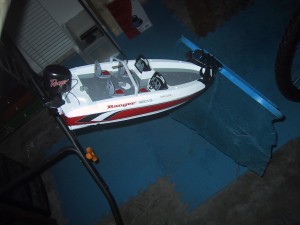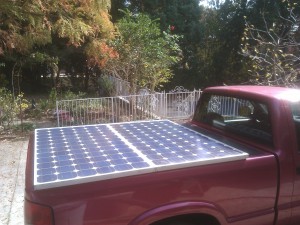Question: “We’re getting whole house solar soon. We are wondering if we should get an electric or solar pool heater?”
To answer this question, I want to keep my terminology clear. I will use “solar-thermal panels” to refer to the rubber roof-mounted panels that have pool water pumped through them for traditional solar pool heaters. I will use “PV solar panels” to refer to photovoltaic panels that generate electricity directly from sunlight. Any pool heater powered by electricity must be a heat pump pool heater (a electric resistance heating element is incredibly inefficient when compared to a heat pump).
There are a lot of trade-offs involved in this question.
First efficiency: Using the sun’s heat to directly heat pool water (as with pumping pool water through a rubber solar-thermal collector on your roof) is about 80% efficient (80% of sunlight is converted to heat in the water). Commercial PV solar panels are only 18-22% efficient converting sunlight to electricity. If you use a restive water heater, this gives you 18-22% efficiency overall, which is bad. HOWEVER, if you use a heat pump electric pool heater, the heat pump uses that 18-22% electricity to move heat from the air into your pool with a 3-4X advantage, so your overall heating efficiency is actually directly comparable to a solar-thermal water heater! [The same math applies to domestic electric hot water heating…hybrid heat pump water heaters are good, traditional resistance elements are not a very efficient use of electricity.]
Second, cost: A heat pump pool heater costs money. So do the extra PV solar panels to power it (plus the up-sized inverter as your PV solar system is larger). I suspect the extra money will be slightly more than a $5,000 solar-thermal water heater arrangement, but it may not be TOO much more. It all comes down to how many kWh you plan on spending to heat your pool. (A heat pump pool heater takes as much power as a whole house AC, it’s basically an AC unit in reverse…pulling heat from the outside air and putting it into your pool.) So this is not an inconsiderable cost.
A 100,000 BTU heat pump pool heater uses 5,000 watts (5kW) when running, or 5kWh per hour of heating. If you wanted to run your pool heater for 5-6 hours every day, you would need to add 5kWh of PV panels to your roof to offset this electric usage. At $2.40 per watt installed, an extra 5,000 watts of PV panels would cost you $12,000!
However, if you only run the pool heater for a few months out of the year and are on a net-metering arrangement, you need to install fewer PV panels, as PV panels produce power all year round. So if you plan on running your pool heater for 5 hours a day only 4 months out of the year, you could get away with installing only 1/3 as many PV panels, or 1.6kW at a cost of $4,000. [You may also have to buy a $2,500 heat pump pool heater if you don’t have one already.]
Third, complexity: A solar-thermal hot water heater requires extra pipes from your pool pump up to the panels on the roof of your house and has a lot of potential leak points. Extra PV solar panels on your roof and a larger inverter don’t add much to the complexity of a whole house PV solar system, just makes it larger, and PV panels have very minimal maintenance issues in the future. An electric heat pump pool heater does require plumbing into your pool pump, but is physically located with the rest of the pool pump equipment, and doesn’t require water pipes up to the roof. Keeping the “roof system” separated from the pool system by electric wires as opposed to water pipes makes “plumbing” easier.
Fourth, roof space: Do you have enough roof space to support all the energy you want to use? Solar-thermal pool heating panels and PV panels used with an electric heat pump pool heater use roughly the same roof surface area for the same amount of heat in the pool. The PV solar panels cost more than rubber pool solar-thermal heat collectors, but have to be replaced less frequently. Heating a pool takes a lot of energy regardless of if you are doing it via photovoltaic or solar-thermal collection. Check with your solar installer to see if you have enough sun facing roof space for everything you want to do.
Fifth, ease of use / flexibility: An electric pool heater allows you to heat the pool whenever you want (cloudy weather, nights). You may need to pay the utility company for your extra use of electricity in bad solar weather, but you have the option to do that if you want. If you install extra PV solar panels to support an electric pool heater, you have the option to NOT run the pool heater and bank extra electricity, which can be used by any electric appliance in the house or an electric vehicle.
[A solar-thermal pool heater prevents you from spending extra money heating your pool at nights or in cloudy weather, but may slightly increase the power needed to run your pool pump unless you actively switch the roof mounted solar heat collectors out of the system when not needed.]
Of course, the cheapest option is to not heat your pool at all.



